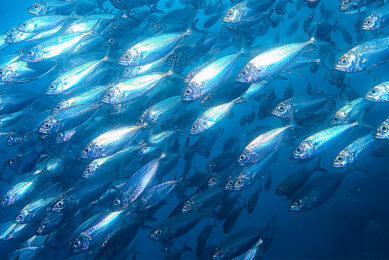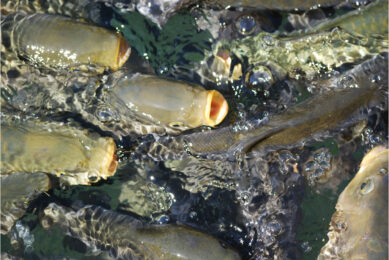Research: Exogenous enzymes in feed for trout
Scientists from Technical University of Denmark, Aquaculture Research Group, CRNA of DSM Nutritional Products, BioMar, Denmark and Novozymes investigated the effects of exogenous enzymes on apparent nutrient digestibility in rainbow trout (Oncorhynchus mykiss) fed diets with high inclusion of plant-based protein.
Plant-based protein ingredients are increasingly used in feed for carnivorous fish as replacement for fish meal.
This study investigated if supplementing diets with high inclusion levels of plant-based protein with three different enzymes could improve the apparent nutrient digestibility in juvenile rainbow trout (Oncorhynchus mykiss).
Trial setup
Three diets with high inclusion levels of either de-hulled, solvent extracted soybean meal (344 g/kg), sunflower meal (246 g/kg), or rapeseed meal (264 g/kg) were produced and feed batches were coated post-extrusion with the different enzymes: β-glucanase at 67 mg/kg, xylanase at 208 mg/kg, protease at 228 mg/kg, or a combination of the three enzymes at the same doses.
Three consecutive digestibility trials were carried out using a flow-through, modified Guelph System.
Each trial was designed to include five dietary treatment groups: a non-supplemented control diet and 4 diets supplemented with either β-glucanase, xylanase, protease or a combination of the three enzymes.
Diets were fed to triplicate tanks and two faecal sampling periods for digestibility measurements for each tank were scheduled.
Each experiment comprised a 10-day digestibility trial succeeded by a water sampling period for measuring the dissolved nitrogen (N) output. Each experiment lasted 17–19 days in total.
Apparent digestibility coefficients (ADCs) of protein, fat, ash, phosphorus and dry matter (DM) were derived from the three digestibility trials, along with calculations of the specific growth rate (SGR, %/d) and feed conversion ratio (FCR).
Nitrogen mass-balance and energy retention were evaluated for each dietary treatment group to elucidate on the utilization of digested nutrients and energy.
Results
Enzyme supplementation had only moderate effect on apparent nutrient digestibility in the sunflower and rapeseed experiments, while β-glucanase and protease improved the apparent digestibility of all dietary nutrients in the soybean experiment.
The effect was more pronounced for lipid than for other nutrients. β-Glucanase had a positive effect on energy retention in the soybean experiment, while there were no effects on nitrogen retention or fish performance in any of the three experiments during the short feeding periods.
Conclusion
The study thus provides preliminary results on the potential of β-glucanase and protease to increase apparent nutrient digestibility of soybean meal in fish feed.











